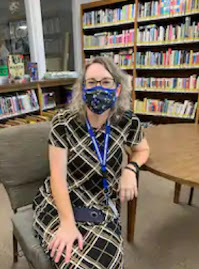"Federal data shows that less than 30 percent of rural residents age 25 and up have an associate degree or higher; more than 43 percent of urban residents do," Laura Pappano reports for The Washington Post. "That’s a problem: Two-thirds of all jobs and 80% of all 'good' jobs (paying a median wage of $65,000) demand a post-secondary credential, according to research by Georgetown University’s Center on Education and the Workforce."
 |
| Hope Perry is college access counselor for the Ayers Foundation. (Photo by Laura Pappano, Hechinger Report) |
That means that counselors don't just encourage all students to go for a four-year university degree; they invite students to consider the best fit for them, whether it's an associate's degree at a community or technical college, or joining the military.
The program's results in several small, rural Tennessee counties are "eye-popping," Pappano reports: "By 2019, Ayers had helped impoverished Perry County reach an 86% college-going rate, the highest in the state, according to government figures. At Decatur County’s Riverside High School, where the foundation has been working since 1999, postsecondary enrollment (including military and technical training) has risen from 24%to 84%. In two other counties, three rural high schools reached that enrollment for 76%, 82 percent and 87% of their 2019 graduates, the foundation reports."
A two-year-old philanthropic initiative, rootEd Alliance, is expanding the Ayers-style model to other rural areas in Tennessee, Missouri, and Texas, Pappano reports for the Post and the Hechinger Report, a nonprofit, independent newsroom focused on inequality and innovation in education.
No comments:
Post a Comment